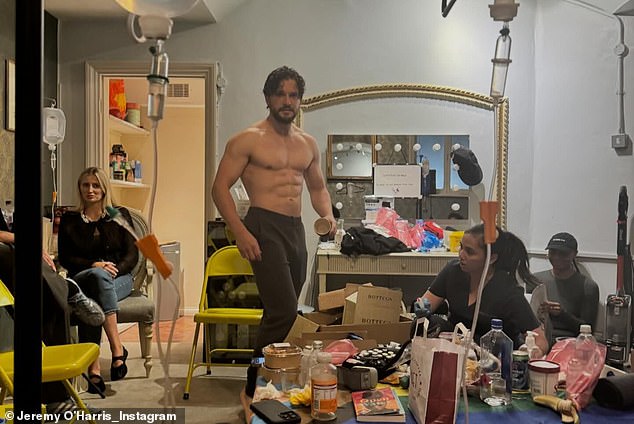Kit Harington shows off his incredibly ripped physique as Slave Play director cheekily shares shirtless snap of him backstage
- Have YOU got a story? Email [email protected]
Kit Harington showed off his incredibly ripped physique in a shirtless snap on Wednesday.
The Game of Thrones actor, 37, is currently starring in Slave Play at the Noel Coward Theatre in London's West End.
And playwright Jeremy O. Harris cheekily shared the sizzling picture of him backstage to his Instagram.
He then joked in the caption: 'Kit's gonna kill me for posting this... (share it so he will forgive me).'
Kit looked to just be chilling backstage as some of the cast and crew sat about near him in the dressing room.

Kit Harington showed off his incredibly ripped physique in a shirtless snap on Wednesday. The Game of Thrones actor, 37, is currently starring in Slave Play in London's West End

Playwright Jeremy O. Harris cheekily shared the sizzling picture of him backstage to his Instagram
He also shared snaps of the cast backstage and some of the incredible audiences they have had in attendance so far.
The play arrived on the West End after getting its own HBO doc and glitzy Broadway audiences, which included Rihanna - whose song Work is reprised during the play.
However, the production was hit by outrage in its off-Broadway run back in 2018 when a petition for closure was launched.
The petition was created by a Black woman who branded the play 'one of the most disrespectful displays of anti-Black sentiment' she had ever seen.
It gained more than 6,000 signatures and the cast received death threats, while the hashtag #ShutDownSlavePlay was made on Twitter.
Once the play hit Broadway it did not create the same level of outrage, however members of the audience regularly walked out during performances, according to The Independent.
The play did cause a stir when it was revealed that their would be two Black Out nights geared towards black audiences, after producers announced shows 'free from the white gaze' in February.
At the time, a spokesperson for then-Prime Minister Rishi Sunak criticised the move and said 'restricting audiences on the basis of race would be wrong and divisive'.

He also shared snaps of the cast backstage and some of the incredible audiences they have had in attendance so far

The play arrived on the West End after getting its own HBO doc and glitzy Broadway audiences, which included Rihanna - whose song Work is reprised during the play
The Independent reviewer, said: 'It's never an easy watch – and its Black Out nights feel like an important gesture to Black audiences who don't want white discomfort to define their experience of it.'
But with or without the injection of A-list glamour, the play has still received four star reviews, with one critic at The Guardian branding it 'an event'.
The reviewer challenged anyone to 'leave the play without needing to argue in favour or against, describe moments, express solidarity or otherwise.'
The 12-time Tony nominated play follows three interracial couples as they work on their relationships through a highly unusual type of sex therapy.

The 12-time Tony nominated play follows three interracial couples as they work on their relationships through a highly unusual type of sex therapy
Kaneisha (Olivia Washington) and Jim (Kit) are joined by two other interracial couples: Alana (Annie McNamara) and Phillip (Aaron Heffernan), plus Gary (Fisayo Akinade) and his (it turns out) actor boyfriend Dustin.
The Evening Standard warned future audiences 'prepare to be shocked' during the 'uncomfortable watch' which uses racist language and 'pornographic Deep South slavery fantasies'.
The lowest rating came from The Times, who offered the play two stars, and claimed: 'the satire of Slave Play can all feel a bit five years ago '. However they did note that it may because that is how long it has taken to get to the West End.









































































































































































































































































































































































